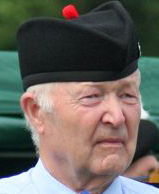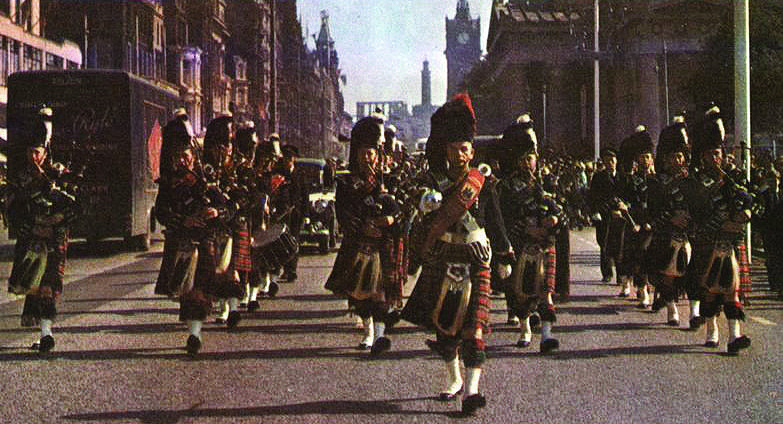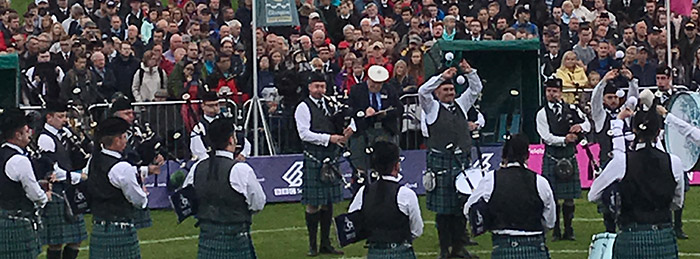
This coming Friday and Saturday will see the annual World Pipe Band Championships at the end of a week of wide-ranging piping, pipe band and traditional music events in Glasgow. The Championships are organised jointly by the Royal Scottish Pipe Band Association (RSPBA), Glasgow Life and the City of Glasgow Council; and they are the pinnacle and most prestigious competition of the RSPBA’s five annual major pipe band championships. This year will be the 70th anniversary of the first time the Championships were held in Glasgow. Since then Glasgow has been the venue on 34 occasions.
In advance of the big event, many readers of Piping Press worldwide may find it interesting to have some information about the history surrounding ‘the Worlds’ and how they have evolved over the years. The long history in fact stretches as far back as 1906, although at that time the WPBC were not organised by the RSPBA, which did not exist until 1930 when it was established as the Scottish Pipe Band Association (SPBA). The first pipe band competition regarded as the World Championship was actually introduced in 1906 as part of the Cowal Highland Gathering in Dunoon, Argyll. It was not until 1947 that the competition became the responsibility of the SPBA, later to become the RSPBA.
The Cowal Highland Gathering
The first Cowal Highland Gathering was held in Dunoon in 1894, reportedly attracting fewer than 2,000 spectators. At that time the event was primarily about athletic and traditional highland ‘heavy’ events. By 1901 the annual Cowal Games, as they became commonly known, were attracting attendances of 5,000 and also participants from overseas. By 1946, following World War 2, attendances had reached 28,000 and have since attracted even higher levels.
The first pipe band competitions introduced at Cowal were in 1906. The Argyll Shield was awarded to the winning Grade 1 pipe band, donated by HRH The Princess Louise, Duchess of Argyll. Between 1906 and 1946 the Grade 1 competition was recognised as the World Pipe Band Championships. The competition was held annually, apart for the World War 1 years 1914-1918, and the World War 2 years 1940-1945.
The SPBA/RSPBA
The SPBA was formed in 1930 and ‘Royal’ status was subsequently conferred on the Association by HM The Queen 50 years later in 1980. Back in 1930, and perhaps fittingly, the idea of a national organisation to regulate and develop pipe bands was broached by three leading pipe majors of the time on the return ferry journey from Cowal Games. The objectives eventually agreed for the Association, which still remain the same, were to:
- promote and encourage the culture and advancement of pipe band music internationally, and to sponsor a pipe band college
- create and maintain a bond of fellowship with all pipe band personnel throughout the world without discrimination as to colour, race, nationality, ethnic or national origins
- devise and operate a proper system of pipe band contest rules; and
- organise the World, European, British, Scottish and all Major Championships held within the United Kingdom.
When the SPBA was formed a pipe band college or similar learning facility was not seen as an immediate priority. The emphasis initially was on fellowship, by bringing band members together in a social capacity to compare notes and benefit from the advice of more advanced colleagues. Lectures were subsequently introduced by leading pipe majors and drummers to encourage the keener students to learn more. It was not until after the Second World War that the requirement for piping and drumming instruction became most acute in view of the need to restore the massive losses caused by the conflict. Piping and drumming schools were established by the SPBA in 1947; and by 1948 they had merged into a single Pipe Band College headed by separate Piping and Drumming Principals.
The first pipe band competition run by the SPBA was at Forthbank Park, Stirling on 18 June 1932. Only fifteen Grade 2 bands competed and the competition format was March, Strathspey and Reel (MSR). In the same competition the following year ten bands competed in Grade 3 with nineteen in Grade 2. As the SPBA grew in strength it was subsequently agreed with the Cowal Highland Gathering committee, after a great deal of acrimonious politics, that the Association would assume ownership of the World Pipe Band Championships. The first WPBC run under SPBA rules were held in 1947 at Murrayfield Stadium in Edinburgh. This was an ‘open’ competition (i.e. not restricted solely to Grade 1 pipe bands).
The competition format again was MSR and twenty-six pipe bands competed. These included famous names like Bowhill Colliery; Renfrew; Shotts and Dykehead Caledonia, Edinburgh City Police; the Clan MacRae Society; Dalzell Highland; and Muirhead & Sons. The winning band was Bowhill Colliery Pipe Band from Fife. Interestingly Glasgow Police Pipe Band did not compete at Murrayfield. In view of the politics they continued to play that year in the Grade 1 competition at Cowal Games. Adjudication in the early years was by a piping and a drumming adjudicator. It was not until 1970 that musical medley competitions were introduced at RSPBA Major Championships, when the concept of ‘ensemble’ adjudication was also introduced. Major Championships are now judged by a team of four adjudicators – two piping, one drumming and one ensemble.

Since 1947 the Worlds have continued to be organised annually by the SPBA/RSPBA. The Cowal Highland Gathering, however, did not lose out completely as the Cowal Pipe Band Championships became one of the SPBA/RSPBA’s five annual Major Championships in 1948, the Argyll Shield still being awarded to the winning Grade 1 pipe band. This arrangement was sustained until 2013, when it was decided that the pipe band competitions had outgrown the facilities at Dunoon Stadium.
As a consequence a reduced pipe band competition was retained at the annual Cowal Games as an RSPBA-supported local event. The Argyll Shield is still awarded to the top band at that competition. From 2014 the fifth RSPBA Major Championship became known as the UK Pipe Band Championship, which has since been held in Belfast, Northern Ireland. The SPBA also held the first Scottish and British Pipe Band Championships in 1948 (in Blairgowrie and Renfrew respectively). The European Pipe Band Championships were first held in Dundee in 1949.
Over the years since 1947 the World Pipe Band Championships have been held in a variety of Scottish locations, ranging from Edinburgh, Glasgow, Dundee, Ayr, Aberdeen, Stirling, Paisley, Kirkcaldy, Inverness, Dumfries, Forfar, Oban, Grangemouth, Perth, Lanark, Hawick, Glenrothes and Hamilton. The Championships have also been held in Northern Ireland on two occasions (Belfast in 1956 and 1962) and in England on two occasions (Corby in 1975 and Nottingham in 1979). Since 1986 the Championships have always been held in Glasgow.
The event now attracts up to 240 individual pipe bands, approximately 60 of which are normally from other countries, reflecting the world-wide interest in Scotland’s national music. The number of spectators has increased to around 40,000. The Grade 1 Finals, and on occasions some other grades, are also filmed by BBC Scotland and are streamed world-wide live over the internet. The Worlds and the events held leading up to the big weekend are a major boost for the Glasgow and Scotland-wide economies.
WPBC format and pipe band grading structure
Traditionally the Worlds had taken place on a single day but in 2013 the RSPBA decided to trial a two-day format in view of the continually increasing number of entries. The two-day format was introduced substantively in 2014 and the Friday is now devoted exclusively to two qualifying heats for Grade 1 pipe bands (which normally number between 20 and 30 in total worldwide).
All other competitions, including the Grade 1 Finals, are held on the Saturday. Since 2014 the Worlds have also been the last of the five RSPBA Major Championships, following which the Champion of Champions awards are made (i.e. the top band in each grade over the five ‘majors’).
The RSPBA operates a structure of nine grades for pipe band competitions. The grades, which in effect are determined primarily according to previous competition results in a form of league structure, are:
Grade 1
Grade 2
Grade 3A
Grade 3B
Grade 4A
Grade 4B
Juvenile
Novice Juvenile A
Novice Juvenile B
The playing requirements differ according to the grade, from march time signatures at the lower levels to MSR or musical medleys of varying durations the higher the level. Grade 1 bands at the WPBC are required to play MSRs and a musical medley.
WPBC Grade 1 winners since 1947
Only 21 Pipe Majors have won the Grade 1 World Championships title in the 70 years since the competition has been run under the auspices of the RSPBA. In that time only 14 different pipe bands have won the title, some of which have been led by different pipe majors at different times. These statistics illustrate clearly the extent of the challenge of winning the top award as well as the leadership qualities required, and possibly a degree of good fortune. In alphabetical order the pipe bands and P/Ms:
Bowhill Colliery (Chris Sutherland)
Clan MacRae Society (A MacLeod)
Dysart & Dundonald (Robert T Shepherd MBE)
Edinburgh City Police/Lothian & Borders Police (Donald S Ramsay and Iain McLeod)
Field Marshal Montgomery (Richard Parkes MBE)
Glasgow Police/Strathclyde Police (John MacDonald and Ian McLellan BEM)
Inveraray and District (Stuart Liddell)

Muirhead & Sons (Jackie Smith and Robert Hardie)
Simon Fraser University (Terry Lee)
Shotts & Dykehead Caledonia (Tom MacAllister Snr, Tom MacAllister Jnr, John K MacAllister, Robert Mathieson and Ryan Canning)
St Laurence O’Toole (Terry Tully)
Victoria Police (Nat Russell)
227 Argyll & Sutherland Highlanders Regt. R.A. (TA) (John Weatherston MBE BEM)
78th Fraser Highlanders (William Livingstone)
The Championships have been won by Pipe Major Ian McLellan BEM of Strathclyde Police on 12 occasions; and by Pipe Major Richard Parkes MBE of Field Marshal Montgomery on 11 occasions – both quite remarkable achievements. Other multiple pipe major winners in alphabetical order are:
Robert Hardie, Muirhead & Sons, 5 times
Terry Lee, Simon Fraser University, 6 times
Tom MacAllister Snr, Shotts & Dykehead Caledonia, twice
John K MacAllister, Shotts & Dykehead Caledonia, 4 times
Tom MacAllister Jnr, Shotts & Dykehead Caledonia, 4 times
John MacDonald, Glasgow Police, twice
Iain McLeod, Edinburgh City/Lothian & Borders Police, 5 times
Robert Mathieson, Shotts & Dykehead Caledonia, 5 times
Donald Shaw Ramsay, Edinburgh City Police, twice
Robert T Shepherd MBE, Dysart & Dundonald, twice
Jackie Smith, Muirhead & Sons, 3 times

Since 1947 the top winning bands have been:
Shotts & Dykehead Caledonia, 16 times
Glasgow Police/Strathclyde Police, 14 times
Field Marshal Montgomery, 11 times
Muirhead & Sons (defunct 1978), 8 times
Edinburgh City/Lothian & Borders Police (defunct 2013), 7 times
Simon Fraser University, 6 times
2017 was a major milestone for both the WPBC and the RSPBA as it reflected the 70th anniversary of the event under the stewardship of the Association. It proved to be another significant year as a new pipe band name entered the record books as World Champions for the first time – Inveraray & District Pipe Band (pictured top). It will be interesting to see if yet another new name will emerge as the winner in 2018.















Recent Comments